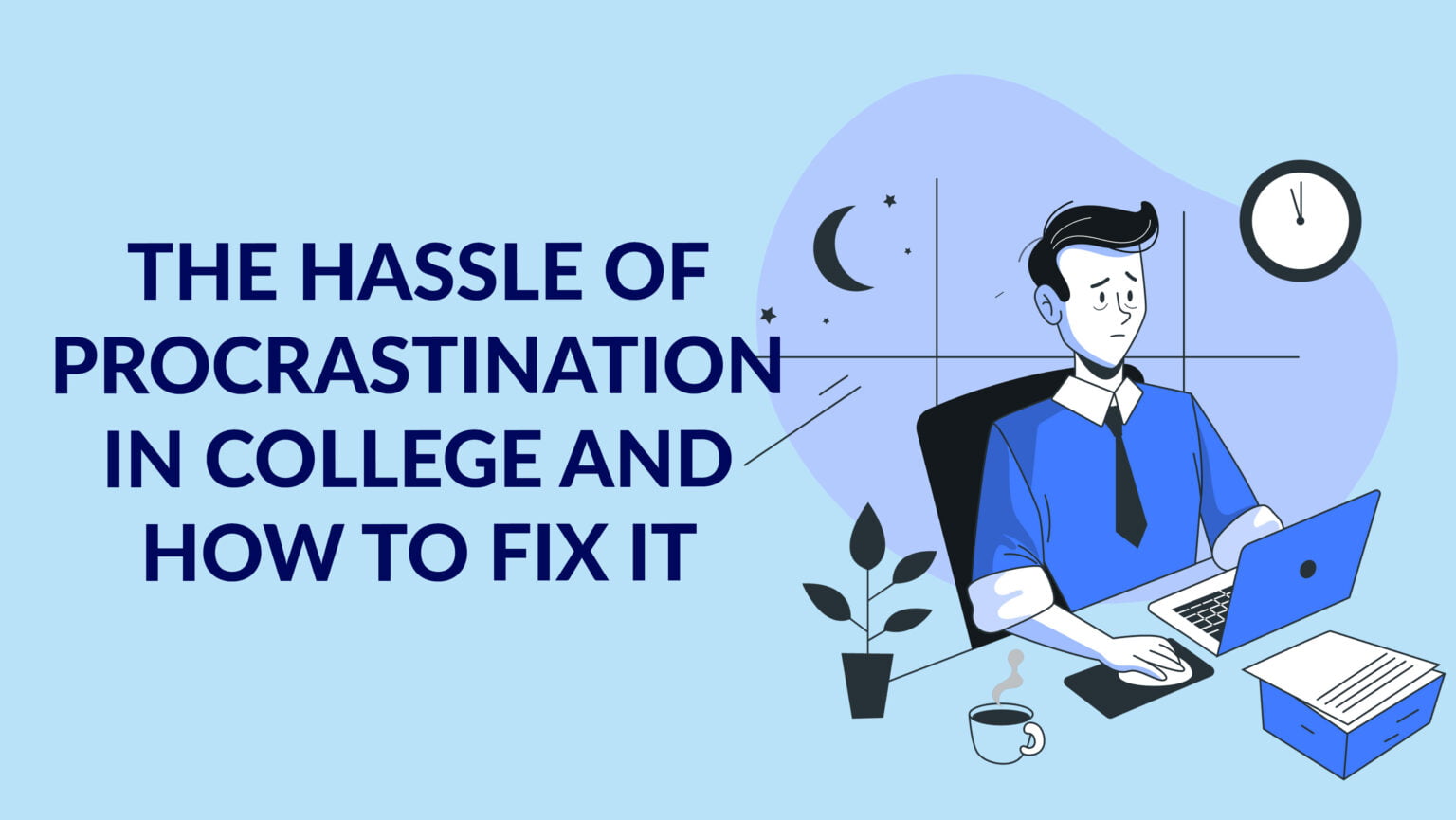Procrastination in college is truly the silent killer of productivity right? It’s easy to get caught up in the temptations of Netflix, social media or napping instead of working on assignments, but this can seriously impact your academic performance.
Aside from affecting grades and academic performance, procrastination can also lead to increased stress levels and anxiety. However, there are tactics that you can implement to ensure that you don’t fall prey to procrastination in college.
If you’re struggling with procrastination and find yourself cramming for deadlines and staying up all night, it’s time to change your habits. In this article, we’ll explore the hassle of procrastination in college, along with practical tips on how to reduce it.
In this article, we’ll examine the causes of procrastination in college, identify signs of procrastination, discover how it affects students, and explore various strategies you can use to overcome it. By following these tips, you’ll be able to better manage your time and maximize your productivity as a student.
Table of Contents
What Leads to Procrastination

There is a big misconception about the reasons that lead to procrastination, one of them is laziness. This cannot be far from the truth, students do not procrastinate because they are lazy, but because they put a lot of value into the result of their work!
This means that you expect so much out of yourself and the result of your assignments that it scares you enough to the point of not doing them at all! This is completely psychological and requires training and discipline to change!
Now that you can better recognize the cause, we can now begin to discuss how it affects you.
How Procrastination Affects Students
Before we get into what you can do to get rid of your procrastinating habits and help your routine, we should first look into how keeping this habit lingering can negatively affect you, even if you can’t help it.
So here are a few ways in which procrastination can affect your performance and well being as well.
Procrastination Affects Your Time Management

Even though you might not related these two together seeing that one is about planning and one is about doing, you should know that procrastination can indeed have a negative impact on your time management skills. When you procrastinate, you’re essentially putting off important tasks until the last minute, which leads to poor time management.
This not only can, but certainly will cause added stress and anxiety, and ultimately result in missed deadlines or subpar work. It’s important to understand how procrastination affects your time management so you can make changes and improve your productivity!
You can’t possibly know how to eliminate this habit if you do not understand what it does to you in the first place!
Procrastination Affects Your Psychological Flexibility
As you know, procrastination in college affects your psychological flexibility in more ways than you might realize. It can lead to feelings of guilt, anxiety, and stress, which then impact your ability to adapt to new situations or bounce back from setbacks.
This happens because when you’re focused on avoiding your work, your brain isn’t able to fully engage in the present moment or switch between tasks easily. The good news is that there are strategies you can use to increase your psychological flexibility and reduce procrastination!
By procrastinating, you are reinforcing fear-based behaviors such as avoidance and escape instead of practicing more flexible and adaptive behaviors like facing challenging tasks head-on. This can ultimately become a bad habit for you as a college student mainly academically speaking.
In fact, research shows that individuals who struggle with procrastination often also have lower levels of resilience and overall emotional well-being. This creates a vicious cycle; the more you procrastinate, the worse you feel emotionally and the less able you are to handle challenges effectively!
We can also say that this is part of the way it affects your mental health.
Now, how do you fix that? We have some tips for you!
Tips on How to Fix Your Procrastination Habit

If you’re struggling with procrastination in college, know that you’re not alone. Procrastination can be a serious roadblock to your academic success and can lead to unnecessary anxiety and stress.
Start The Day By Making Your Bed
Starting your day by making your bed may sound trivial, but trust us, it’s an excellent way to build momentum. It creates a sense of accomplishment and sets a positive tone for the day ahead!
Taking just a few minutes to make your bed each morning will give you a small win that can lead to bigger wins throughout the day. It’s a simple but effective step towards overcoming procrastination and improving productivity in college.
In addition to setting the right tone for your day, making your bed has other benefits too. It can help reduce stress, increase your self-discipline, and even make your bedroom look more organized.
Plus, coming back to a neatly made bed after a long day of classes and studying will be much more inviting than climbing into rumpled sheets. So why not start off on the right foot each day by taking care of this simple task?
Who knows, this might trick your brain into getting things done!
Break Your Tasks Down
Procrastination in college can be defused by breaking down your tasks into smaller, more manageable pieces. Why? Well because when you have a large project due, it’s easy to feel overwhelmed and not know where to start.
By dividing it into smaller components, each with a clear goal and a deadline, you’ll develop momentum that will help you get things done.
One way to break things down is to create a task list with deadlines for each item. Another option is to use a timer and work in shorter bursts of focused activity followed by short breaks.
It’s important to experiment with different approaches until you find what works best for you. And don’t forget: breaking your tasks down doesn’t just make them easier to do – it can actually help you produce better work too!
Sometimes the smaller the better!
Execute These Tasks With Passion

You might not have fueling passion to write a 3000 words essay about someone who passed away hundreds of years ago and whose life does not interest you the least bit, but a tiny shred of passion will help you get far when you are dealing with procrastination!
When you execute tasks with passion, procrastination begins to fade. Passion fuels your motivation and keeps you interested in the task at hand.
You can start by visualizing a successful outcome of what you’re working on. If it’s a research paper, imagine the satisfaction of receiving an A grade or if it’s a group project, picture your team scoring high marks for their efforts.
Also, try to find something positive in each task you must complete. Maybe there’s an aspect of the task that genuinely interests you or perhaps it provides an opportunity for personal growth – focus on that part of the task and let that motivate you to carry on.
By executing tasks with passion, not only will you be able to overcome procrastination but also find joy in completing your work, which leads to higher productivity!
Reward Yourself Often
Rewarding yourself often is a great way to combat procrastination in college. After all, who doesn’t love being rewarded for their hard work?
When you break your procrastination cycle by completing tasks on time, give yourself a pat on the back with a small reward like a piece of candy or short YouTube video. Over time, you can increase the reward value for bigger accomplishments like completing a term paper or acing an exam.
The key to effective rewards is choosing something that motivates you personally. It’s not just about the size of the reward; it’s about what drives you to get things done.
By associating productive behavior with positive outcomes, your motivation will soar and procrastination will take a backseat. So go ahead and indulge in some rewards – it might just be the secret to your academic success!
Never underestimate the power of positive reinforcement!
Implement the 10-minute Technique
Procrastination can be a tough habit to break, especially in college. But implementing the 10-minute technique is a great way to get started on your work.
All you have to do is commit to working on a task for just 10 minutes. Once that time is up, you can either continue working or take a break – but chances are, you’ll feel motivated to keep going!
This technique helps the brain overcome what feels like an insurmountable obstacle by just starting. The small amount of time commitment removes the pressure and anxiety that comes with trying to tackle an entire project at once.
Over time, those 10 minute increments will add up and before you know it, your project will be complete! Plus, you’ll feel more accomplished and motivated each time you complete another section of your work.
Just remember that the 10-minute technique may not work for every student in every situation. If after ten minutes you’re feeling too overwhelmed or stressed, having a break may be helpful as well.
Starting small does not overwhelm you and at the same time it allows you to get things done!
Also Read; Top 10 Productivity Apps Every Student Should Try
Bottom Line
In conclusion, procrastination in college is a common issue among students that can lead to negative consequences such as stress and poor academic performance. However, there are ways to combat this problem.
By changing your mindset, breaking down tasks into smaller steps, and eliminating distractions, you can increase your productivity and achieve your goals more efficiently!
It may take some time to overcome the habit of procrastination, but with patience and determination, you can succeed academically and set yourself up for success in the future.
Ok, we covered a lot about procrastination in general right? We hope you found value in this post. As you know at Tips for Students, we publish useful and actionable content for college students so if you like to read more student content you can head over to our student blog.
See you in the next useful article.
Good luck!




